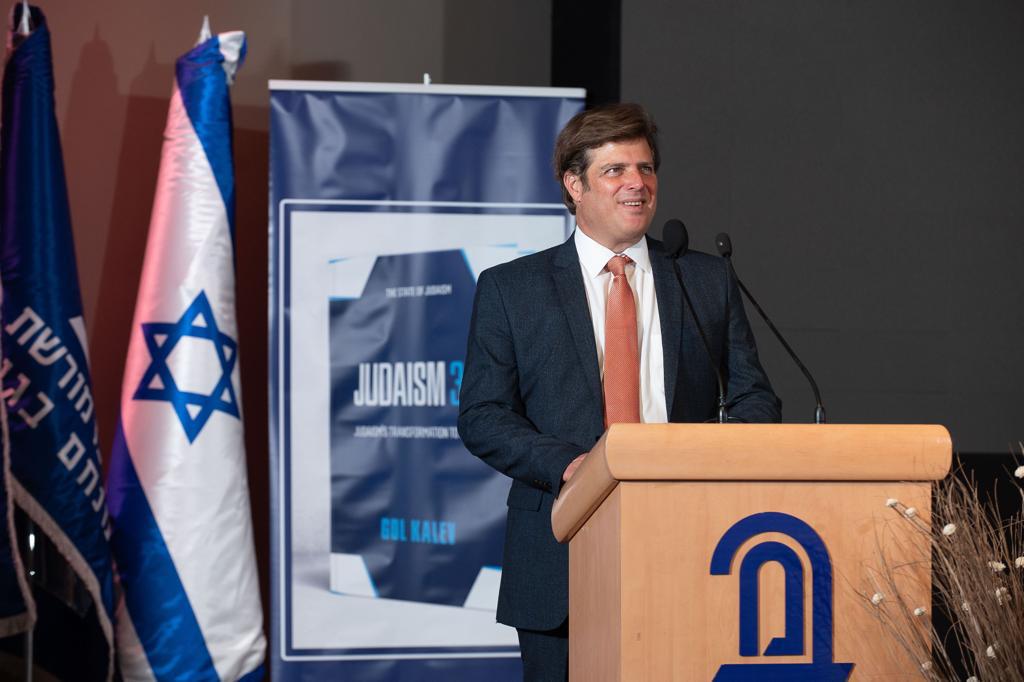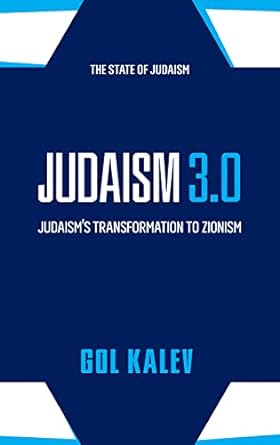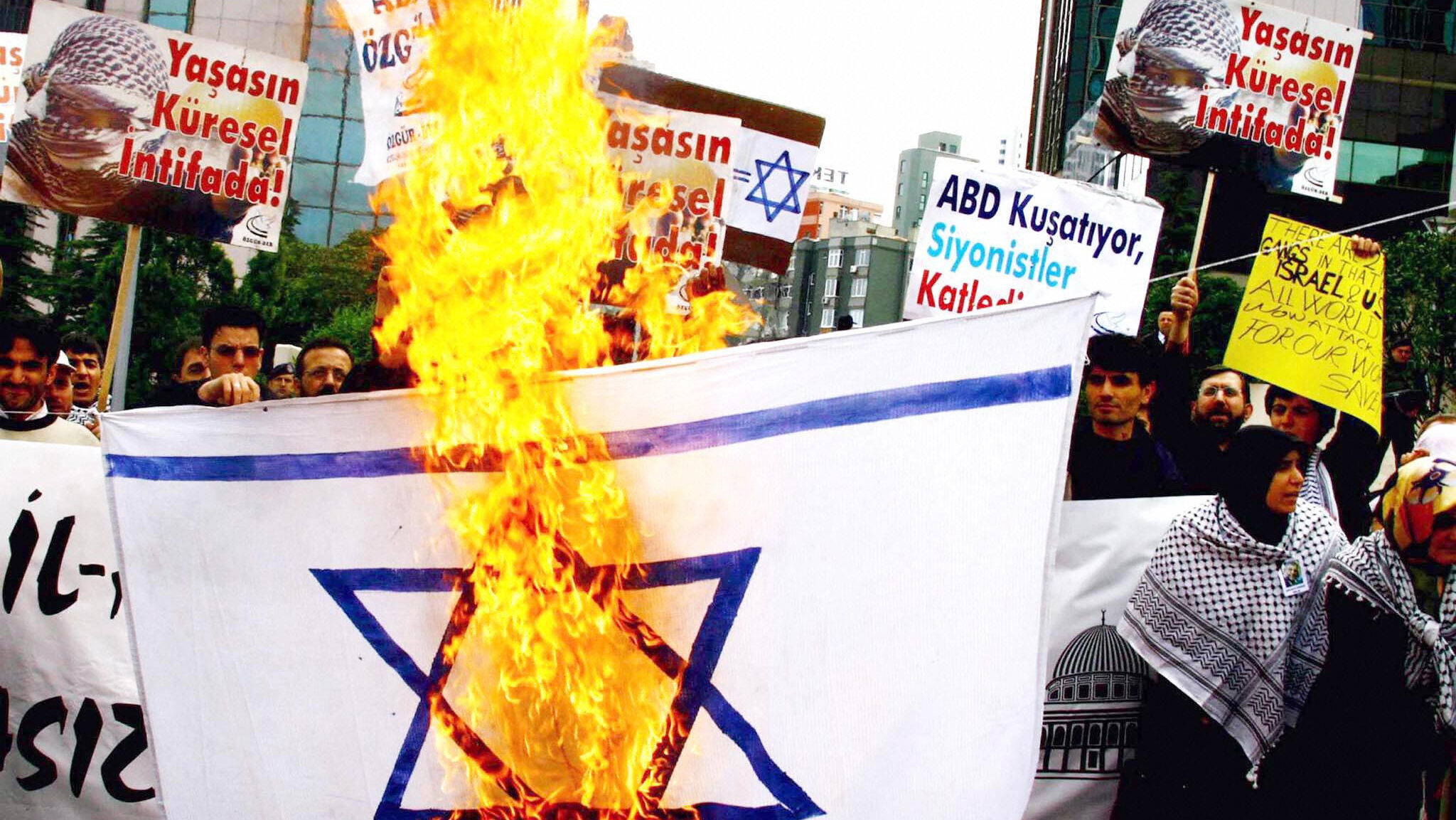Anti-Zionism: A ‘Gateway Drug’ to Antisemitism
Israeli author Gol Kalev contends that anti-Zionism represents the most perilous form of antisemitism, advocating the broad recognition that Zionism became the anchor of Judaism as the optimal response
In the aftermath of Hamas’ lethal attack on Israel on Oct. 7 and the subsequent Israeli counteroffensive in Gaza, perceptions of a link between antisemitism and anti-Zionism have intensified. Just three days after the massacre, pro-Palestinian demonstrators in Sydney led chants of “gas the Jews.” In certain instances, individuals who are generally considered thoughtful appear hesitant to denounce antisemitism, especially when it coincides with criticism of Israel. This was evident when three presidents of major US universities did not define calls for the genocide of Jews as harassment during a recent congressional hearing on antisemitism in colleges.
In his 2022 book Judaism 3.0, Israeli author Gol Kalev argues that Zionism is the anchor of modern Judaism. Kalev explains that as Judaism has evolved to emphasize Zionism, antisemitism has similarly shifted its focus to anti-Zionism.
The arguments from Kalev’s book were highlighted in a series of recent debates, culminating in a discussion at the Menachem Begin Heritage Center on Sept. 12 with Deputy Mayor of Jerusalem Fleur Hassan-Nahoum and Herzl Center Chairman Uri Zaki.
In an interview with The Media Line, Kalev stated that anti-Zionism has emerged as the predominant form of antisemitism in the US, accounting for 60% to 80% of antisemitic incidents.

Gol Kalev speaks at the Menachem Begin Heritage Center, Sept. 12, 2023. (Courtesy)
Kalev further asserted that anti-Zionism, in addition to its prevalence, poses a greater danger than traditional forms of antisemitism. “Antisemitism can lead to violence and inflicts damage against individual Jews and their safety. Comments like ‘Jews will not replace us’ or ‘The Jews control the media’ … can lead to violence. But it is not an existential threat to Judaism because there is no ‘destruction’ mechanism in antisemitism. Such a mechanism exists in anti-Zionism,” he explained.
Antisemitism can lead to violence. … But it is not an existential threat to Judaism because there is no ‘destruction’ mechanism in antisemitism. Such a mechanism exists in anti-Zionism.
Hours after the Oct. 7 massacre, anti-Zionist protests broke out globally, with many openly displaying antisemitic sentiments. In the weeks following the start of the war, violent antisemitic hate crimes rose by over 400% in the US and by over 1,350% in the UK.
Beyond inciting physical violence, anti-Zionism has also triggered ongoing International Criminal Court probes into Israel and Israelis, potentially resulting in the arrest of Israeli citizens overseas and sanctions or other international actions against Israeli and Jewish entities.
Kalev pointed out that comparable actions were implemented against Russia following its 2022 invasion of Ukraine, underscoring the gravity of this threat.
What Zionism is, and what Zionism isn’t
Zionism is broadly defined as the nationalist movement expressing the Jewish people’s aspirations to live in their ancestral homeland.
Theodor Herzl, credited as the founder of modern political Zionism, envisaged a Jewish state as a refuge for all Jews, irrespective of their level of religious observance, seeking sanctuary from pogroms and antisemitism.
After Israel’s establishment in 1948, Zionism’s focus shifted toward safeguarding and fostering the State of Israel, established as the nation-state of the Jewish people.
While anti-Zionists frequently label Zionism as a colonialist endeavor, Zionists argue that it is more accurately an anti-colonialist movement, aiming to free the Jewish people from statelessness and the land from a history of foreign dominations under the British, Ottomans, Mamluks, Crusaders, etc.

Gol Kalev’s 2022 book Judaism 3.0. (Courtesy)
Deputy Mayor of Jerusalem Hassan-Nahoum observed that the native connection of Jews to the land of Israel is self-evident to Israelis, complicating their ability to tackle antisemitism.
I don’t think Israelis fully understand what antisemitism and anti-Zionism really are. They don’t understand the importance of the narrative … that [Jews] are indigenous to the land. It’s obvious to them. … They think people already know.
“I don’t think Israelis fully understand what antisemitism and anti-Zionism really are,” she said. “They don’t understand the importance of the narrative … that [Jews] are indigenous to the land. It’s obvious to them. They don’t feel that anybody needs to know. They think people already know.”
Zaki explained to The Media Line his perspective on how the inherent connection of Jews to the land of Israel renders anti-Zionism intrinsically antisemitic.
I see any anti-Zionist criticism per se as a form of antisemitism because the notion of Zionism is that the Jewish people, as any other peoples in the world, deserve self-determination. An anti-Zionist premise assumes that the Jewish people is different from any other peoples.
“First of all, I see any anti-Zionist criticism per se as a form of antisemitism,” Zaki said, “because the notion of Zionism is that the Jewish people, as any other peoples in the world, deserve self-determination. An anti-Zionist premise assumes that the Jewish people is different from any other peoples. And hence, that’s a form of antisemitism.”
The panelists discussed how anti-Zionism has found a foothold in contemporary, liberal environments, unlike traditional antisemitism. While classical antisemitism is often linked to white nationalist and neo-Nazi ideologies, anti-Zionism tends to align with progressive and anti-racist movements. Such associations gained prominence following a 1975 UN resolution, later retracted, which categorized Zionism as a form of racism, and were further reinforced by recent reports from human rights groups labeling Israel as an apartheid state.

(L-R) Herzl Center Chairman Uri Zaki, Gol Kalev, and Deputy Mayor of Jerusalem Fleur Hassan-Nahoum speak at the Menachem Begin Heritage Center, Sept. 12, 2023. (Courtesy)
Consequently, anti-Zionism has thrived in left-leaning settings, including on college campuses and within the British Labour Party. Paul Gross, the debate moderator, noted that numerous self-proclaimed anti-Zionists do not recognize the antisemitic nature of their attitudes.
Gross characterized anti-Zionism as “a sort of ‘gateway drug’ for antisemitism.”
He discussed the UK Labour Party’s infatuation with former leader Jeremy Corbyn, who spread “left-wing tropes about how Zionism is racism and colonialism and that the forming of the state of Israel is not just a sin against the Palestinians, but against a wider idea of justice in itself.”
From there, he told The Media Line, the party became “literally infested, not only with criticisms [of Israel] but with downright antisemitism, where you start hearing Labour municipal leaders talking about the Jewish lobby and Jewish power, or Jewish conspiracy theories about 9/11, or how the Jews ran the slave trade … and all these things come out of the woodwork that would otherwise have been inconceivable” had the anti-Zionist ideology not paved the way.
Given these dynamics, it can be hard to draw a line between legitimate criticism of Israel, anti-Zionism, and antisemitism.
Zaki told The Media Line that some criticisms of Israeli policies are legitimate, including criticism of Israel’s ongoing occupation of the West Bank “and even regarding policies on Gaza on the eve of October 7.”
Speaking to The Media Line, Zaki acknowledged that certain criticisms of Israeli policies are warranted. This includes issues regarding Israel’s continued occupation of the West Bank and its policies concerning Gaza, especially on the eve of October 7.
Similarly, Zaki characterized the question of the Israeli military’s adherence to international law as “a legitimate debate.”
Although Zaki recognizes the validity of some criticisms, he mentioned that his sensitivity to critiques of Israel has heightened following the recent Hamas attacks. He expressed concern over the disproportionate focus on Israel’s expected counteroffensive in Gaza rather than on the atrocity that occurred on October 7, labeling it “very problematic.” “I don’t think we would have seen the same outcry had the attack been in any other place in the Western world,” he continued.
He criticized certain progressive organizations for either showing sympathy toward Hamas or offering only formal condemnations before quickly turning their criticisms towards Israel. “The volume of the criticism toward Israel was much louder” than that of the criticism of Hamas, he said. “And that shows a unique treatment of Israel that is unlike any other democracy or nation.”
Kalev said that legitimate critiques of Israel as well as the Jewish community are possible. While protections for critical debates should be enshrined and upheld, “there is a line,” he said.
He referred to prevalent accusations that Israeli Jews are indiscriminately killing women and children, and perpetrating a genocide against Palestinians. “That is absolutely antisemitism,” he said, comparing such claims to a blood libel.
Solutions
Zaki, Hassan-Nahoum, and Kalev expressed different visions for responding to the wave of anti-Zionism.
Zaki opined that the inability of Israeli leaders to sincerely address Palestinian political aspirations has inadvertently energized anti-Zionist sentiments, particularly among young, less informed progressive groups.
Hassan-Nahoum said that the war “has woken a lot of these people up,” including many Jewish students “who now understand that there’s a lot more going on [in Israel] and they’ve been sold a lie” by their anti-Zionist universities.

Deputy Mayor of Jerusalem Fleur Hassan-Nahoum speaks at the Menachem Begin Heritage Center, Sept. 12. (Courtesy)
She argued that a common misconception among anti-Zionists is that the core issue of the Israeli-Palestinian conflict is the absence of a Palestinian state, whereas, in her view, the actual catalyst for violence is the existence of a Jewish state. While some believe “that the Palestinians want a state more than they want to destroy us … I believe the opposite,” she said.
Kalev, too, said that successful negotiations with the Palestinian Authority would do little to defang the anti-Zionist movement.
He said that Herzl, too, once entertained the idea that “if Jews just behave better or stop irritating the Europeans, then antisemitism will stop or at least not be so bad. But in the end, Herzl concluded that you cannot reason with hate.”
Kalev pointed to progressive friends and friends from the UN who once said that disengaging from Gaza, which Israel occupied from 1967 to 2005, would give Israel the moral high ground in the case of an attack from Hamas and lead to widespread international support in such a situation. “Now we see in that exact scenario we defend ourselves but get an official designation from the UN that our defensive operation amounts to crimes against humanity,” he said.
He also contended that Israeli public relations efforts, commonly referred to as hasbara, have proven to be ineffective. “You cannot change dogmatic minds,” he said.
He suggested that the true remedy for the issue of anti-Zionism lies in establishing Zionism as the “anchor of Judaism” in worldwide discourse, thereby ensuring that anti-Zionism is universally recognized as being as reprehensible as antisemitism.

